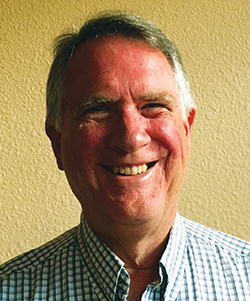Rectal Cancer Survivor
Don’t Let Cancer Define You

Steve Stluka was diagnosed with Stage II rectal cancer in 2005. His oncologist recommended a clinical trial that was testing a new targeted therapy drug for colorectal cancer. After doing his research, Steve agreed to participate in the trial. After taking the new drug, in addition to other chemotherapies and surgery, he was declared cancer-free in 2013. Steve is working and volunteering his time to help others fighting cancer.
In November 2004, I went to the doctor after noticing rectal bleeding. Although I had requested a colonoscopy, he declined it and performed a sigmoidoscopy instead. However, once he completed that test, he sent me to get a colonoscopy. The tests confirmed I had cancer. In January 2005, at 52, I was diagnosed with Stage II rectal cancer. I thought, “This kind of thing doesn’t happen to me.”
My doctor recommended that I have surgery by a vascular surgeon and possibly follow up with some radiation. I was not satisfied with the recommendation and decided to research treatment options and other hospitals. I did considerable research on several websites and discovered The Bloch Cancer Foundation. Their literature was instrumental as I did my due diligence and it gave me inspiration. A work associate made a few calls for me, and I found the hospital I wanted.
I underwent extensive prep there, including MRI, CT, and PET, along with a full treatment plan designated by the tumor board at the hospital. While I was being “scoped” for the radiation treatments to come, my oncologist told me about a clinical trial he thought that I would be a good candidate for. It was discussed at the tumor board and then presented to me as an option.
In my research, I read that if a clinical trial is offered where you are getting treatment, you should seriously consider it. The reason is that often the clinical trials are at the leading edge of fighting the disease. The trial I entered was for a targeted therapy medication that is classified as a "monoclonal antibody" and "epidermal growth factor receptor (EGFR) Inhibitor."
I was excited about participating in the trial. The cost of the trial drug, administration and tests were all covered by the pharmaceutical company sponsoring the trial. They treated me very well, and I felt I was not only helping myself but potentially helping others by doing the trial.
I was in the trial from the end of January 2005 to the beginning of May 2005. I continued to take the radiation and the chemotherapy drugs I was taking prior to surgery. After that portion of treatment, I was given about 30 days to recoup. Next, I had a surgical resection with 30 days to recover and then six additional rounds of chemotherapy.
During my treatment, I had the usual side effects of chemotherapy and radiation, though they were very well-controlled. However, the doctors told me prior to treatment that I would not be the “same” as before treatment. They did say that there was a very good chance I would be OK. One of the chemotherapy drugs did cause neuropathy in my feet. The main side effect of the trial drug was a red, acne-like rash that broke out on my shoulders and face. It was a sign of the drug getting into my system, and it went away after the trial concluded and the drug dissipated from my body.
After the chemotherapy and surgery, my doctors watched me closely for the first year. I had quarterly CT and MRI scans, followed by semi-annual CT scans for three years and annual CT scans for the next three years. My doctors declared me cured in 2013, and my case was closed. I now get a colonoscopy every five years.
I am fortunate to have friends and family who are there when I need or want them. My wife was with me often. She passed away from brain cancer (gliobalastoma) in 2012. Even though she went with me, I took myself to and from treatment whenever I could because I wanted that feeling of control and independence. I also worked through most of my treatment except when I took a few weeks off after the surgery. I did not and do not let the cancer experience define me.
To others going through a similar experience, I'd say make sure you are confident in your providers. And, I do recommend that others give clinical trials a try because I believe that they can offer a boost to standard-of-care treatments. You should never feel like you’re second guessing yourself. The more you can educate yourself about the specifics of the diagnosis and what the current practice treatments are, the better. Lastly, be confident that you'll pull through fine and move onward.
I currently volunteer for the Bloch Cancer Foundation. It's an on-call type of approach that offers peer-to-peer counseling, so it’s very flexible, and I believe in what they do. I learned so much from following their suggestions on doing my own due diligence and taking charge that I wanted to give back to others. I want to share that knowledge with other people going through a similar experience. The foundation’s approach of matching the diagnosed with survivors is sound. Experience helps create credibility.


